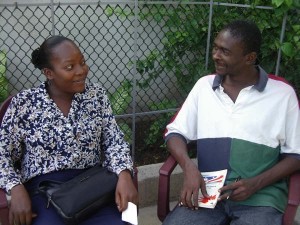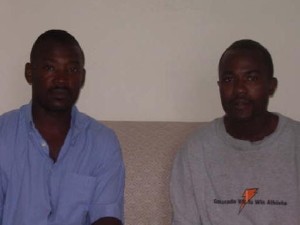I just spent a week in a luxury hotel along a beautiful stretch of the Haitian coast, but it wasn’t my fault. The hotel had all the trimmings, or at least most of them. The hot running water in our room’s clean, spacious bathroom was the least of it. There were manicured lawns; a well-kept koi pond with its own small flock of fat geese; a beautiful outdoor dining room, with clean tableclothes and place settings and great views of Lagonav across the bay; elegant food; a playground with a small basketball court, volleyball court, swing set, jungle gym, and mini-golf; a private beach; a swimming pool full of clear water; a scrupulously polite and attentive staff; and more air-conditioning than a soul could know what to do with.
It took me by surprise. I had been expecting to spend the week in Gonayiv, the coastal city north of Pòtoprens that was hit hardest by last year’s hurricane. Thousands of people were killed. Many more lost their homes and everything else. I’d heard that the engagement of larger aid organizations there had been ressembling nothing more than a feeding-frenzy.
I had been through Gonayiv several times on my way to the northeast, and was struck by the number of large signs advertising that this or that NGO was hard at work, helping the city and its residents rebuild. But I had also been struck by the clear evidence of the hurricane’s destructive path. There’s a new inland lake in an area just outside the city that was once inhabited. People even fish in it. There are remnants of walls and houses both in the city and around it. Some buildings in the city still show their high-water marks.
One of the organizations very active in Gonayiv is Care, and Care contacted Fonkoze for help organizing a literacy program. It had undertaken to find foster homes for children who had been orphaned by AIDS or the hurricane or otherwise. Care was providing a good deal of financial support to these homes, but was looking for ways to help them build the capacity to support themselves. Helping them do so would involve educational programs, and the educational programs would be hard to organize because many of those who need them are unable to read. Care had heard of Fonkoze’s literacy curriculum, which is built around a board game called “Korelit”, and had asked Fonkoze to send someone to teach a group of ten how to use Korelit. Fonkoze had, in turn, asked me to organize and run the workshop together with one of its literacy field workers, a young man named Elysée.
The two of us arrived at Care’s Petyonvil office Monday morning at 7:00. We were supposed to leave at 7:30. I had been surprised by the planning, because I knew that the workshop was supposed run for five days and that unless we arrived in Gonayiv Sunday night we would lose most of, if not all of, Monday. Gonayiv is a good four-hour drive from the Pòtoprens area. I had also read the contract between Care and Fonkoze and knew that we were to return from Gonayiv Friday. The would mean losing much of Friday as well, especially since few people or organizations would plan to arrive in Pòtoprens after midafternoon. To do so would mean risking arrival after dark, and that’s not prudent.
So I was unclear as to just how much time Elysée and I would have with the Care team, and this complicated our planning. Fonkoze had sent Care its standard schedule for a five-day introductory workshop. That it do so was stipulated in the contract it signed with Care. But Elysée and I wouldn’t be able to count on following it because we didn’t know how many days we would actually have: Four seemed like a best-case scenario, but we would need to know what we would do if we only had three. To complicate matters further: Elysée had been providing technical support to Fonkoze literacy teachers for almost a year, and he had done the logistical work to organize a workshop, he had never actually taught literacy using Korelit nor led a workshop.
Elysée and I had spent the preceding Friday afternoon organizing the minimally necessary topics into six half-day modules that we could present in order, whether we started Monday afternoon or Tuesday morning. An extra half-day or two with the Care team would give us the important chance to have them practice what we had done together.
When we were still sitting in care’s office at almost ten, I figured that all of Monday had been lost, but Elysée and I had done our planning, so we were calm. When we finally set out, I learned that we’d be going only as far as Monri. That’s where the workshop would be held. Monri is much closer to Pòtoprens than Gonayiv is, so it became clear that an extra half-day or two would be possible after all.
My guess was that four days would be enough to present a five-day workshop if we managed our time well – a big “if”. As much as Fonkoze tries to emphasize participatory learning, its literacy staff tends to do so through long speeches. The staff tends to model just what it wants its literacy teachers to avoid. This is a very general problem in the alternative education that I’ve seen. In any case, I felt that if we could reduce our talking time, increase the focus on putting the Care team to work, we could get more done in less time.
What I didn’t know was what the members of the team we’d be working with would be like. I’ve been very reluctant to push Fonkoze to shrink its workshops because the women that Fonkoze is preparing to work as teachers aren’t, for the most part, very educated themselves. It can take a lot of time to explain things like what a vowel is.
The Care team was something quite different, though. It too, like the Fonkoze groups we had been working with, was all women. But these women were university graduates: nurses, public health experts, administrators, and even medical doctors. They are flawlessly literate and fluent in French, but some had problems writing Creole correctly at first. Though it is their native language, some of them had never really learned to read and write it well. Nevertheless they are used to sitting in a classroom, working to master something new, so getting them up to speed was quick and easy. My own part of the workshop was easy as well: None lacked the confidence to speak in a group. And though they weren’t always the most patient of listeners, they were more than astute enough to recognize that as a problem they would need to work on.
So they workshop went smoothly. There will be problems in the coming three or four months as Care implements its program. It turns out that Fonkoze and Care were not at all clear with one another as to Care’s goals for the project, so adapting what we at Fonkoze planned so that it meets Care’s needs will take some work. But it’s work that can be done. Care understands better now what it wants from Fonkoze and is prepared to work with us to see that its goals can be met.
I myself have to wonder about the decision to put the workshop in such a luxurious setting. Fonkoze would not have chosen to do so. First and foremost because of the expense. Lacking the funds to offer even basic literacy to all its clients, Fonkoze could not justify the extra money that holding the workshop at Moulin Sur Mer entails.
But it is not only a question of money. One of the problems we struggle with is the tendency for a distance to appear between the literacy teachers we prepare and the students they are teaching. The person who’s serving as teacher may be a market woman with a busines right next to those belonging to the other market women in her class. But having been identified as a teacher, she will often tend to slip into a traditonal authority role.
We try to combat this tendency both in word and in deed. In our words, we encourage our literacy teachers to consider themselves, first and foremost, as participants working with other participants in their classes. In our actions, we try to model equality between teachers and students by organizing workshops that are as informal and as participatory as possible. So it would make little sense for Fonkoze to whisk its literacy teachers away to a luxury resort, someplace none of them would otherwise go. It would send the wrong sort of message.
But Care’s situation is different. Its highly educated staff members already belong to a class quite different from the one the families they’ll be working with belong to. There’s no denying that. They are preparing to take on a new responsibility in an area where they have no expertise. Hosting them in a comfortable space while they prepare themselves makes a certain amount of sense: They need to get started with as positive a sense of the project as possible.
When I asked Elysée what he thought of the workshop’s setting, he said that the type of person that Care is using has certain expectations. Failing to host them in comfort would only cause problems. When I asked him whether what he meant was that they are already spoiled and that we have to accept that, he smiled and said “yes.”
Whether it’s worth the extra money is a question I can not answer. I must admit that the clean bathroom was nice.

